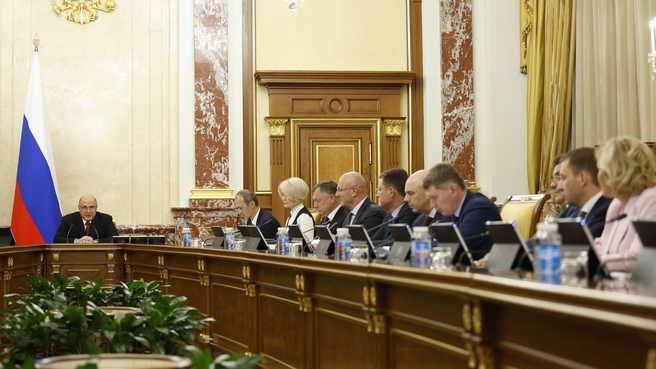Agenda: The Energy Saving and Energy Efficiency Enhancement state programme, streamlining state support for high technology companies.
Mikhail Mishustin’s opening remarks:
Good afternoon, colleagues,
I would like to say a few words before we address the Government meeting’s agenda.
Last week, I attended the launch of a power substation in the Moscow Region. It uses Russian software which, apart from being highly reliable, helps to reduce power losses during the transmission and distribution of electricity. This is important for our entire economy.
The President emphasised the need to achieve the ambitious aims of reducing the power intensity of the GDP and therefore the negative impact on the environment.
On his instructions, we have drawn up and approved a comprehensive state programme entitled Energy Saving and Energy Efficiency Enhancement, which is aimed at a step-by-step reduction by more than one-third of resource consumption per unit of output.
These measures are primarily directed at obviating power losses as much as possible and increasing net heat and electricity generation during their production, transmission and use in all sectors of the economy. This will expand the potential for further economic growth and reduce the impact of fuel costs on prices. This means that we will be able to produce more goods and services, while keeping expenditure at the same level. Simultaneously we will be cutting down on harmful emissions and thereby improving living standards.
Now let us address the agenda.
On the President’s instructions, the Government is working to achieve sovereignty in the key branches of industry.
Today, we will consider an issue related to improving the measures of state support for high-technology companies.
This assistance must be maximally effective, targeted, and aimed at implementing ideas and initiatives in the sphere of innovations.
We will also discuss how to adjust the financial instrument used by the Skolkovo Centre’s startups. What I have in mind is to compensate customs and VAT expenses incurred while importing equipment, spare parts, and other products. Each year, the federal budget allocates nearly 250 million roubles for these purposes.
The Government has drafted a bill introducing an important condition to the effect that preferential treatment should only be extended to goods imported for research purposes.
In this context, we suggest that priority and speedy customs clearance be extended not only to current but also former residents of this development institution, as well as to participants in industrial clusters and technological parks, and to research institutes.
This approach will make it possible to accelerate the creation of science-intensive products and solutions, including in such important areas as microelectronics, unmanned transport systems, additive technologies, biochemistry, and more. This means that Russian plants will be able to increase the production of high-quality output for our citizens so as to provide people with everything they need.










